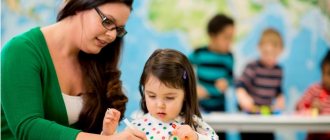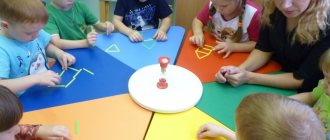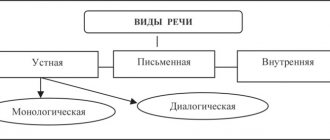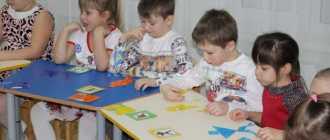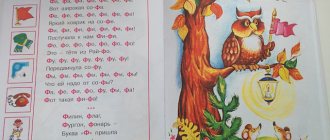Methodological recommendations for the development of sociocultural values in preschool children
Olga Aleksandrovna Ryabtseva
Methodological recommendations for the development of sociocultural values in preschool children
Sociocultural development is the formation in children of a system of values : ideas about good and evil, truth and lies, time and space, friendship, etc. In the process of sociocultural education social experience , knowledge, abilities, skills are acquired, communication and interaction with other people lay down certain norms and rules.
Preschool age is a period when the child is very sensitive, sensitive to sociocultural development , the world of spiritual values , moral principles, human relationships, etc. opens up before children.
Currently, preschool education is aimed at developing and partnership in different sociocultural conditions preschool children . And from this it is clear that this is impossible without knowledge of the cultural values of one’s own and other peoples.
In preschool age, the formation of the foundation of personality is formed: self-esteem, emotional intelligence, moral values and socialization . All this makes the problem of sociocultural education of children in kindergarten .
Introducing children to sociocultural norms is one of the main principles of the Federal State Educational Standard for Education. When writing a kindergarten program, it is necessary to take into account the specifics of the sociocultural conditions in which educational activities are carried out. (Annex 1)
The sociocultural development of a child, according to the Federal State Educational Standard, should be carried out by introducing children to sociocultural norms , traditions of the family, society and the state; it is necessary to form in preschoolers primary ideas about the cultural traditions of their people.
Sociocultural development is closely related to the reproduction of generally accepted norms and rules, with the help of which the preservation of the traditions of peoples is ensured. After all, tradition is “ a value-based sociocultural communication between generations of people that determines all subsequent development of culture ”; a set of ideas, rituals, habits and skills of practical and social activity, passed on from generation to generation, serving as one of the regulators of social relations.
The works of many researchers on sociocultural development (N. Ya. Bolshunova, T. V. Sokolova, K. I. Chizhova, S. V. Kaganovich, etc.). They note that sociocultural development is determined by the ability to compare life with models. They should be presented as a system of human attitudes and communication styles, as well as with the help of rituals, in holding holidays, reading and dramatizing fairy tales, proverbs and sayings, nursery rhymes, conducting gaming trainings, outdoor and role-playing games, thematic projects, exhibitions and much more. . etc., which should be in the preschool education . (Appendix 2.3)
After all, holding holidays, reading folk tales, etc. is a communicative event; it provides preschoolers with knowledge of the cultural values of their people .
Properly organized preschool education allows children to independently identify sociocultural guidelines that they can use in later life. When introducing Russian culture to preschool children , it is necessary to identify the content that will be accessible to the preschooler .
At the initial stage, it is important to determine the level of sociocultural development of children using various methods (for example: N. I. Popomnyashchaya “Object pictures”
,
"3 questions"
;
O. A. Orekhova “Houses”
, etc.).
They allow us to understand those spiritual values , personal relationships (food, sleep, rest; the world of things, animals; play; family, friends; phenomena of the surrounding world, travel; study, work, leisure; profession; art, science; human feelings, etc. which the preschooler already possesses , and, accordingly, build his work in the right key.In
the process of receiving preschool education, preschoolers measure , compare their actions, actions, with the actions and actions of other children , educators, parents, etc., thereby mastering sociocultural norms .
The formation of sociocultural values is interconnected with the conditions in which the child directly lives and is raised, and here the family plays a very important role, because the first and main educators of children are parents . A. S. Makarenko said: “The main foundations of a person’s upbringing are laid before the age of 5, and then there is only the processing of the person.” In the formation of a child as an individual, the formation of his moral position, the main role belongs to the family; it is the family that lays the foundation for the child’s moral values . And deviations in upbringing can seriously complicate his future life, since his ideas about truth and lies, good and evil, may not coincide with the ideas of other children and adults .
For the correct formation of values, purposeful pedagogical activity is necessary, which will contribute to the sociocultural development of preschool children in kindergarten .
In the educational activities of a kindergarten, it is important to identify a problem that needs to be solved in the future: firstly, the perception of universal moral values (good, evil, friendship, politeness, conscience, love, etc.)
.
In the process of competent sociocultural education preschoolers gain experience in active interaction with adults and peers, develop the ability to sympathize, empathize and understand the emotional state of other people and form adequate self-esteem.
Teachers of a preschool institution need to create conditions for introducing the children of their parents to basic sociocultural values , ensure the unity of the cognitive, emotional and moral development of preschoolers , contribute to the creation of a systemic sociocultural space for education and communication in a preschool institution , and, of course, improve the pedagogical culture of parents. At the same time, one of the main conditions for achieving results is the competently formed sociocultural values of the teaching staff of the kindergarten.
If the above requirements are met, preschoolers easily master the system of sociocultural values , they will develop communication skills (listen to each other, express their opinions, negotiate, and many others; children will develop : verbal interaction; motivation to communicate, self-control, independence and etc.
List of used literature
1. Zakharova L. M., Purskalova Yu. V. Sociocultural development of a preschool child in the process of familiarization with the culture of the peoples of the world [Electronic resource] / https://www.teoria-practica.ru
2. Kakhnovich S.V. Sociocultural approach to the aesthetic education of preschool children // Primary school plus Before and After. – 2011. – No. 10. – P. 69 – 74.3.
3. Kutyreva S.I. Methodological development of project activities for the sociocultural development of children of senior preschool age “We live together”
[Electronic resource]/ https://nsportal.ru/detskii-sad
4. Nikolaeva I. A. Family as a sociocultural environment for the development of a child [Electronic resource] / https://www.maam.ru/detskijsad
5. Chizhova K. I. Sociocultural development of children in the process of musical education [Electronic resource] / https://www.dissercat.com
Introducing children to sociocultural norms, traditions of family, society and state
Author:
Gafurova Aminat Shamilovna,
teacher of MBDOU "DS KV "Golden Key"
Yamalo-Nenets Autonomous Okrug, Purovsky district, Tarko-Sale
“Every minute of life and every corner of the earth, every person with whom the developing personality comes into contact” educates V. A. Sukhomlinsky
Slide No. 1
Raising a child is impossible without familiarization with universal cultural values, without familiarity with the cultural and historical heritage of the people. Preschool age is the age of formation of the foundations of personality. It has its potential for the formation of higher social feelings, which include the feeling of patriotism. To find the right way to cultivate love for the Motherland, you must first imagine on the basis of what feelings this love can be formed.
The work of introducing pupils to sociocultural norms begins with creating a warm, cozy, friendly atmosphere for children in kindergarten. Every day of a child should be filled with confidential communication, meaningful activities, the joy of discovery, good friends, and favorite games.
Slide No. 2,
Slide number 3
independent creativity.
It is necessary to gradually and purposefully instill in children a love for their family and kindergarten.
(Slide4),
to his native land (Slide No. 5), to his small Motherland (Slide No. 6). This will be the foundation on which the feeling of love for one’s Fatherland will be formed in the future.
In order to raise a child as a worthy citizen of Russia, it is very important in preschool age to help children “see” the beauty of their native nature, to introduce them to the culture and traditions of our ancestors, to the respect and way of life of their fellow citizens. Introducing children of senior preschool age to sociocultural values will be successful if interaction with the family is ensured.
The family is of decisive importance in instilling patriotism and love for one’s native land. It is in the family that basic values are laid and love for the native land is instilled.
In this regard, the main goal in working with older preschoolers is to get to know their native land, educate children about local history, relying on their creativity and inclusion in active activities. The MBDOU “DS KV “Golden Key” is implementing a network educational program “My Homeland - My Yamal”. It is addressed to preschool children of preschool educational institutions and is designed to help preschoolers master Yamal as their environment of existence, master various ways of interacting with the city, and understand their own emotional and value-based attitude to the cultural heritage of the region. The program is an emerging part of the main educational program of the preschool educational institution. In addition, to implement the regional component, I developed a long-term, creative, educational, intergroup project: “On the map of Yamal, not a small dot...”
Slide No. 7
Project goal: To educate children to love their native land. IN
The project has been allocated 4 blocks:
BLOCK 1 - NATURE OF YAMAL
BLOCK 2 - LIFE OF NATIVE PEOPLE.
BLOCK 3- CULTURE OF INDIGENOUS PEOPLES. BLOCK 4 - FOLK AND APPLIED ART OF YAMAL.
There are various forms of organizing children's activities: games; conversations; excursions, etc.
To familiarize children with their native land, she paid great attention to creating a subject-development environment. It is in a certain subject-developmental spatial environment that a child acquires ideals, values, masters culture and acquires aesthetic taste.
Slide No. 8
- Drilling in the 80s. We introduce children to the past and present, what drilling rigs were like in the 80s and what modern equipment is currently
- Professions (traditional and modern) we also introduce children to the professions of adultsSlad No. 9
- Life of the indigenous peoples (chum, sledges, dishes, cradle for a baby, covering for the chum) children can go to the tent, sit, play. Slide No. 10
- Cultural heritage: fairy tales, legends, riddles Slide No. 11
- Decorative and applied arts. We introduce children to crafts made from beads, fur, and bones. children themselves weave simple beadwork and embroider. Slide No. 12
- They also come from the Center of National Cultures, have conversations, play national games with children
It should be noted that many exhibits were donated to the museum by parents. The children are very proud of this.
It has become a good tradition in our educational institution to invite parents to such events as “Mother’s Day”, “Zarnichka”, “Children’s Day”, musical and sports entertainment: “Dad, Mom, I am a friendly family”, “Defender of the Fatherland Day” Slide No. 13
Environmental campaigns are held annually: “Live, Christmas tree!”, Slide No. 14 “Help the birds in winter!”, Slide No. 15
competition “Feeder for a Friend” Teachers together with children produce leaflets and appeals for the residents of Tarko-Sale.
Main tasks: familiarization with sociocultural norms; active participation in environmentally oriented activities; development of children's creative abilities.
During the events, preschoolers receive natural history knowledge, develop environmental culture skills, and an active life position. All environmental events and promotions are held under the common motto: “Only together, only in harmony, we need to help nature!”
It should be noted that the educational process in preschool educational institutions is implemented in accordance with the complex thematic principle, taking into account the integration of educational areas. The planning reflects the holding of holidays with folk traditions: Carols, Maslenitsa.
Slide No. 16
The campaign “Letter to a Soldier”, “Parcel to a Soldier” is traditionally held.
Children together with their parents collect a package for a soldier. Together with the children we go to the post office and send a package. Slide No. 17
Also, every spring the sports game “Zarnichka” is held, where not only older preschoolers, but also their parents take an active part. After completing all the stages, a field kitchen is organized where participants can eat soldier’s porridge. Slide number 18.
Children have repeatedly given concerts at the boarding house Slide No. 19
Thus, in modern education, tasks focused on the spiritual life of society are highlighted: family, cultural heritage, native nature, history of the people, our Motherland - what constitutes the foundation of the formation of an individual. Senior preschool age is favorable for familiarization with sociocultural norms, traditions of the family, society and state, since it is at this age that children most intensively begin to assimilate the values of the society in which they live.
Certificate of publication in the media" Series A No. 0005378
We invite teachers of preschool education in the Tyumen region, Yamal-Nenets Autonomous Okrug and Khanty-Mansi Autonomous Okrug-Yugra to publish their teaching materials: - Pedagogical experience, original programs, teaching aids, presentations for classes, electronic games; — Personally developed notes and scenarios of educational activities, projects, master classes (including videos), forms of work with families and teachers.
Why is it profitable to publish with us?
1. “Kindergartens of the Tyumen Region” is an officially registered specialized media outlet at the federal level. 2. The activities of the editorial office are supported by the Department of Education and Science of the Tyumen Region 3. We issue a “Certificate of Publication” in the media. 4. The document has a unique number, is entered in the register, has the original seal of the editorial office of the online publication and signature. 5. “Certificate of publication” in the media is sent to the author in both paper and electronic versions.
Details >>>
Sample “Certificate of publication of author’s methodological material in the media.”pdf
Share
SOCIOCULTURAL DEVELOPMENT OF PRESCHOOL CHILDREN BY MEANS OF GAME TECHNOLOGIES
Published in 2022, Issue No. 2(56) February 2022, PEDAGOGICAL SCIENCES | No comments yet
Gubanova N.F.
Candidate of Pedagogical Sciences, State Social and Humanitarian University
SOCIOCULTURAL DEVELOPMENT OF PRESCHOOL CHILDREN BY MEANS OF GAME TECHNOLOGIES
annotation
The article discusses issues of sociocultural development of preschool children in theatrical play. The artistic and creative beginning of these types of games allows the child to gain genuine communication with art, enter into a situation of creativity and transformation, master the skills and methods of constructing a game and its components (plot, game actions, game behavior). The article presents the pedagogical technology for the sociocultural development of preschool children through artistic and creative play, gives development tasks, describes the stages and results of the work, and reflects educational activities with children.
Key words: sociocultural development, artistic and creative (theatrical) game, pedagogical (game) technology, preschoolers.
Gubanova NF
PhD in Pedagogy, Associate professor, State University of Social Studies and Humanities
SOCIOCULTURAL DEVELOPMENT OF PRESCHOOL CHILDREN THROUGH PLAY TECHNIQUES
Abstract
The issues of preschool children's sociocultural development within the theatricalized play are viewed in the article. Artistic and creative origins of such plays help the child to learn the art authentically, to enter the situation of creativity and transformation, to master the methods of building the play and its components (the plot, the play action, the play behavior). The article shows pedagogical technique of sociocultural development by means of artistic and creative play, provides the goals of development, describes stages and results of work, covers educational activity with children.
Keywords: sociocultural development, an artistic and creative play (a theatricalized play), a pedagogical technique (a play technique), preschool children.
In modern society, the upbringing and training of an individual can be considered positive and successful only on the basis of introducing him to the values of the surrounding world, the formation of a trusting attitude towards life, towards people, the manifestation of interest in social and cultural achievements, the development of life-creative consciousness and behavior, and civic position. It is necessary to specifically design the positive sociocultural development of children, taking care of the organic introduction of preschoolers into the complex world of human relationships.
Issues of sociocultural development of preschool children were studied by scientists L.S. Vygotsky, S.L. Rubinstein, A.N. Leontyev, A.V. Zaporozhets, V.S. Sobkin and others, whose works reveal the mechanisms of personal socialization, instillation of cultural norms, and creativity as a sociocultural activity. In the process of sociocultural education, the child observes the behavior of adults in normative situations and reads the type of behavior; in the future he acts as the situation requires; the collision of forms of behavior (observable and real) contributes to the advancement of the individual in a cultural direction.
In preschool childhood, it is of great importance to take into account sensitive periods as a time of special sensitivity of the child to certain influences; For sociocultural development, preschool is a time of trial and experimentation, when the child develops a desire for independence; using this, an adult can help awaken children's initiative.
The sociocultural development of a child occurs in the most appropriate activities for them through play, communication, learning, work, and aesthetic activities. Play and communication are leading in this process, as they ensure the emergence of basic new formations, satisfy the needs and capabilities of the child, and represent the dominant type of relationship between the child and others.
Gaming activity serves as a way to understand the world and contributes to the development of independence in assessing what is happening; In the game, the child recreates a fragment of reality in his own way, creates a game situation “as if” and does this in accordance with his own desires, vision, and skills. Game communication allows participants to coordinate their actions, compare desires, and take into account the opinions of others.
Communication allows the child to solve many communicative tasks (manage the actions of partners, control their behavior, evaluate the quality of the process and its result, etc.); It is through communication that various forms of behavior are formed (children can express their opinions, talk about what worries them, be expressive, answer affirmatively or disagree, etc.). Communication connections help the child interact with other people (peers, adults), and in this regard, verbal communication leads the child’s development. At the same time, he learns his native language, its norms, as well as expressive means, and can use them when communicating.
The situation of play and communication as a holistic pedagogical situation helps the teacher determine the context of interaction between an adult and a child, set a range of educational tasks, achieve their solution, analyze the effectiveness of educational influences and take this into account in subsequent situations.
Let's look at an example of technology.
Pedagogical technology for the sociocultural development of preschool children through artistic and creative play.
Content.
Purpose of use: Sociocultural development of children of senior preschool age in the process of artistic and creative play.
Application algorithm:
Stage 1. Organization of conditions for children’s full perception of artistic and creative action (performance).
Stage 2. Enriching children's experience with musical and artistic impressions from small theatrical productions.
Stage 3. Formation of elementary gaming skills in artistic and creative action (game).
In the process of interaction, group and individual work with children takes place, cultural and educational activities are carried out with teachers and parents.
Result:
Stage 1. The teacher organizes work on the perception of theatrical play by children 5-6 years old: creates a motivating space and initiates communication that encourages perception.
Stage 2. Children’s experience of perceiving works of art is enriched: they have an emotionally positive attitude towards the presentation of the dramatization, and adequately respond to the events of the plot.
Stage 3. Children develop elementary gaming skills in artistic and creative play: follow the progress of the plot, listen and hear the speech of the characters addressed to them, respond to means of artistic expression (intonation, tempo, timbre, dynamics, etc.).
While working with adults and preschoolers through artistic and creative play, they develop ideas, knowledge and skills about the surrounding reality.
Educational activities on the sociocultural development of preschool children.
- Formation of musical and figurative performances with the help of theatrical games conducted by teachers (improvisations, skits, puppet concerts, etc.).
- Fostering a culture of perception of artistic performances on folklore themes, an attentive attitude to Russian folk art.
- Creating an emotionally positive atmosphere of interaction with children.
- Formation of sociocultural abilities and skills in artistic and creative activities: to be actively selective (in developing a plan, in choosing means of play, relationships), taking on roles, changing the plot during the game.
Features of age development.
Children 5-6 years old are quite independent, they can create a plan, distribute roles and agree on storylines before the game begins.
Children recognize and highlight real and play relationships. The game highlights the main playing space. Children show genuine interest in the twists and turns of the plot and in the chosen roles. Preschoolers develop imaginative thinking, which allows them to transform the available space, the original plan, and role behavior. To form a full-fledged role-playing game, children need additional data about the object, phenomena and relationships of interest. They have a need to write stories.
Tasks of child development through theatrical play.
- Continue to cultivate children's attentive attitude to the artistic image. Involve in game actions, teach to be active in interpreting the actions of familiar characters.
- Encourage you to take on more challenging roles. Teach gaming skills (creating a plan, using a variety of intonations, storylines).
- Involve children in showing their own dramatizations, performances, and small skits.
- Create a creative spirit in completing tasks, arouse interest in changing playing positions (initiative - little initiative role).
- Learn to use equipment to play in a new situation, change roles, equipment and attributes as the game progresses.
- Involve children in costume making and craft activities.
- Foster a creative attitude towards playing roles and dramatizations.
- Encourage targeted preparation of the performance (for parents, for peers).
Results of implementation of pedagogical technology.
- Preschoolers become familiar with artistic performance and spectacle as a cultural process.
- Children learn to understand the sociocultural side of the content of literary sources (fairy tales, nursery rhymes, songs, etc.) through expressive means (melody, rhythm, tempo, etc.).
- Children learn to act simply expressively in a play situation (monitor their movements, facial expressions).
In general, the game plays a socio-cultural role: it forms an aesthetic vision of the environment; its variety - theatrical play - is a creative activity that allows you to develop not only the artistry of children and their playing skills, but also creates a special, aesthetic socio-cultural situation that shapes value-oriented behavior.
List of literature / References
- Gubanova N.F. Play activities in kindergarten. A manual for working with children aged 2-7 years / N.F. Gubanova. – M.: Mozaika-Sintez, 2015. – 128 p.
- Gubanova N.F. Development of children's play activities from birth to school / N.F. Gubanova // Preparing students to master professional competencies in teaching, education and development of preschoolers and junior schoolchildren: monograph / ed. G.S. Vyalikova; Moscow State Regional Social and Humanitarian Institute. – Kolomna: MGOSGI, 2015. – P. 124 – 155.
- Leontyev A.N. Problems of mental development / A.N. Leontyev. – M.: Moscow University Publishing House, 1981. – 584 p.
- From birth to school. Basic educational program of preschool education / Ed. NOT. Veraksy, T.S. Komarova, M.A. Vasilyeva. – 3rd ed., rev. and additional – M.: Mozaika-Sintez, 2016. – 368 p.
- Elkonin D.B. Psychology of play / D.B. Elkonin. – 2nd ed. – M.: Humanitarian Center VLADOS, 1999. – 360 p.
List of literature in English / References in English
- Gubanova NF Igrovaya deyatel'nost' v children's sadu. Posobie dlya work s det'mi 2-7 let. / NF Gubanova. – M. – Mozaika-Sintez:, 2015. – 128 p.
- Gubanova NF Razvitiye igrovoj deyatel'nosti detej ot rozhdeniya do shkoly / NF Gubanova // Podgotovka studentov k ovladeniyu professional'nymi kompetentsiyami po obucheniyu, vospitaniyu i razvitiyu doshkol'nikov i mladshikh shkol'nikov: monografiya/pod red GS Vyalikovoj; Moskovskij gosudarstvennyj oblastnoj sotsial'no-humanitarnyj institut . – Kolomna, MGOSGI, 2015. – p. 124 – 155.
- Leontiyev AN Problemy razvitiya psikhiki / AN Leontiyev. – M.: Izd-vo Moskovskogo universiteta, 1981. – 584 p.
- From rozhdeniya to shkoly. Osnovnaya obrazovatel'naya programma doshkol'nogo obrazovaniya / Pod red. NE Veraksy, TS Komarovoj, MA Vasil'yevoj. – 3rd edition. ispr. i dop. – [Under the editorship of NE Veraksa, TS Komarova, MA Vasil'yeva. – 3rd edition, revised and enlarged] M.: Mozaika-Sintez, 2016. – 368 p.
- El'konin DB Psikhologiya games / DB El'konin. – 2ye izd [2nd edition]. – M.: Humanitarian tsentr VLADOS, 1999. – 360 p.
The concept of “Sociocultural values” in accordance with the Federal State Educational Standard in preschool educational institutions Educator: Chiklicheeva G.Sh.
Slide 1
MBDOU Kindergarten “Teremok” The concept of “sociocultural values” in accordance with the Federal State Educational Standard Educator: Chiklicheeva G.Sh.
Slide 2
In Federal State Educational Standards up to: 1.4. Basic principles of preschool education: 6) familiarizing children with sociocultural norms, traditions of the family, society and state;
Slide 3
1.6. The standard is aimed at solving the following tasks: 5) combining training and education into a holistic educational process based on spiritual, moral and sociocultural values and socially accepted rules and norms of behavior in the interests of the individual, family, and society; 6) the formation of a general culture of the personality of children, including the values of a healthy lifestyle, the development of their social, moral, aesthetic, intellectual, physical qualities, initiative, independence and responsibility of the child, the formation of prerequisites for educational activities; formation of a sociocultural environment corresponding to the age, individual, psychological and physiological characteristics of children;
The standard is aimed at solving the following tasks: 5) combining training and education into a holistic educational process based on spiritual, moral and sociocultural values and socially accepted rules and norms of behavior in the interests of the individual, family, and society; 6) the formation of a general culture of the personality of children, including the values of a healthy lifestyle, the development of their social, moral, aesthetic, intellectual, physical qualities, initiative, independence and responsibility of the child, the formation of prerequisites for educational activities; formation of a sociocultural environment corresponding to the age, individual, psychological and physiological characteristics of children;
Slide 4
In educational areas: Socio-communicative development is aimed at assimilating the norms and values accepted in society, including moral and ethical values; Cognitive development of the idea of the socio-cultural values of our people
Slide 5
The part of the Program formed by participants in educational relations may include various areas chosen by participants in educational relations from among partial and other programs and/or created by them independently. This part of the Program should take into account the educational needs, interests and motives of children, members of their families and teachers and, in particular, can be focused on: - the specifics of national, sociocultural and other conditions in which educational activities are carried out; selection of those partial educational programs and forms of organizing work with children that best suit the needs and interests of children, as well as the capabilities of the teaching staff; - established traditions of the Organization or Group.
Slide 6
Culture (Latin – cultivation) is a historically established set of social norms and values that are used by people to improve and develop society.
Slide 7
CULTURE material social spiritual
Slide 8
Social culture is an element of the entire spiritual life of society. It embodies the social memory and wisdom of previous generations and protects society.
Slide 9
Sociocultural development is associated with the reproduction of social norms and rules, methods of activity that ensure the continuity of the functioning of human society, that is, the reproduction of its culture.
Slide 10
Classification of values. Vital Social Political Moral Religious Aesthetic
Slide 11
VITAL VALUES LIFE HEALTH PHYSICALITY SAFETY WELL-BEING HUMAN CONDITION (SATIETY, PEACE, VIVILITY) STRENGTH ENDURANCE QUALITY OF LIFE NATURAL ENVIRONMENT PRACTICALITY CONSUMPTION
Slide 12
SOCIAL VALUES SOCIAL POSITION HARD WORK WEALTH WORK FAMILY UNITY PATRIOTISM TOLERANCE DISCIPLINE ENTREPRENEURSHIP RISK TAKEN EQUALITY SOCIAL EQUALITY OF THE GENDERS ABILITY TO ACHIEVE PERSONAL INDEPENDENCE PROFESSION ONALISM ACTIVE PARTICIPATION IN THE LIFE OF SOCIETY CONSUMPTION LEVEL
Slide 13
POLITICAL VALUES FREEDOM OF SPEECH CIVIL LIBERTIES LEGALITY ORDER GOOD GOVERNMENT CONSTITUTION CIVIL PEACE
Slide 14
MORAL VALUES KINDNESS LOVE FRIENDSHIP HONESTY LOYALTY GOOD DUTY JUSTICE MUTUAL HELP UNSELFLY RESPECT FOR ELDERS LOVE FOR CHILDREN DECEPTY HONOR JUSTICE
Slide 15
RELIGIOUS VALUES God SALVATION FAITH GRACE Sacred Scripture and Tradition RITUAL DIVINE LAW
Slide 16
AESTHETIC VALUES BEAUTY IMITATION FOLLOWING TRADITION CULTURAL IDENTITY STYLE HARMONY
Let us dwell on the characteristics of the child’s age values.
The values of preschool age are manifested in children’s judgments, methods of action, behavior, and attitude towards the surrounding reality. They serve as generalized signs of childhood, conditions that ensure the successful development of a preschooler as a whole. The concept of “preschool values” is inextricably linked with the psychophysiological characteristics of children.
The psychophysiological characteristics of young children are described in detail in the works of N.A. Aksarina, V.M. Bekhtereva, N.M. Shchelovanova and others. These include:
- intensive pace of physical development,
- imitation,
- sensorimotor need,
- increased emotionality and vulnerability of the child’s body,
- suggestibility,
- impressionability,
- insufficient morphological and functional maturity of organs and systems,
- insufficient mobility of nervous processes.
The psychophysiological characteristics of preschool children include:
- comprehension and understanding of the environment through imaginative thinking and imagination (L.S. Vygotsky, N.N. Poddyakov, etc.),
- increased motor activity (N.A. Bernshtein, Yu.F. Znamovsky, etc.),
- the relationship between the emotional and sensory spheres, which is reflected in the emotional tone of sensations (A.V. Zaporozhets),
- the dominance of emotions in the worldview, the perception of people around (T.I. Grizik, A.D. Kosheleva, etc.),
- insufficient development of voluntariness of all mental processes and self-control (L.I. Bozhovich, L.A. Wenger, V.S. Mukhina, etc.),
- the predominance of emotional regulation of activity over voluntary activity (A.V. Zaporozhets, Ya.Z. Neverovich).
Each psychophysical feature of children serves as the basis for designating the very age values of children.
